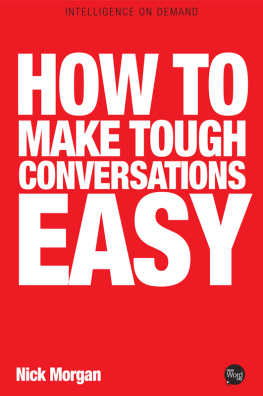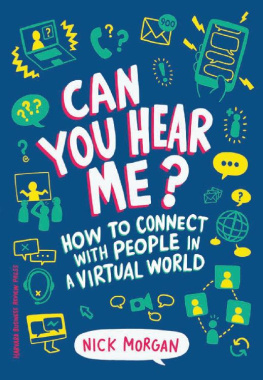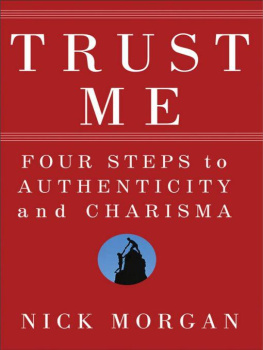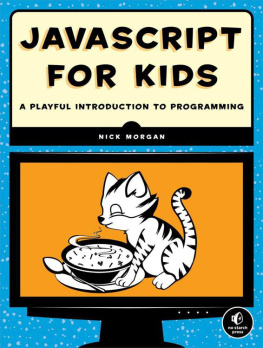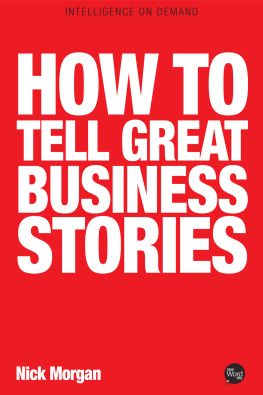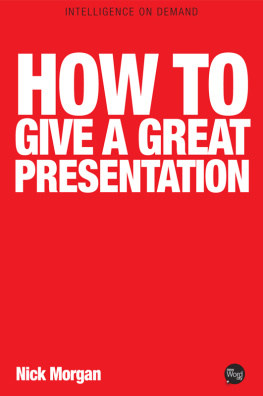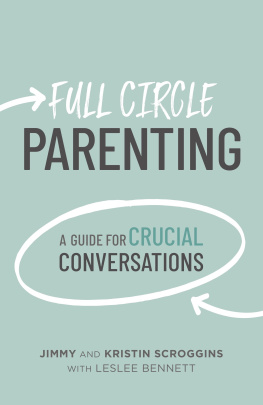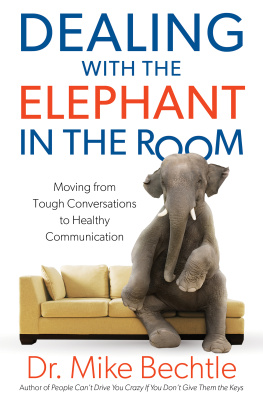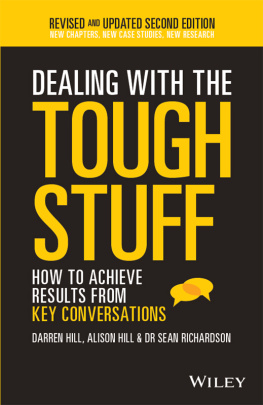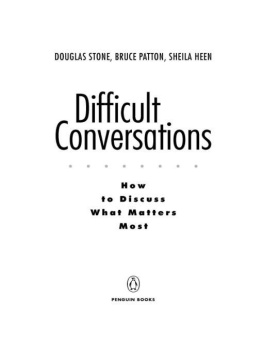Nick Morgan - How To Make Tough Conversations Easy
Here you can read online Nick Morgan - How To Make Tough Conversations Easy full text of the book (entire story) in english for free. Download pdf and epub, get meaning, cover and reviews about this ebook. year: 2013, publisher: New Word City, LLC, genre: Business. Description of the work, (preface) as well as reviews are available. Best literature library LitArk.com created for fans of good reading and offers a wide selection of genres:
Romance novel
Science fiction
Adventure
Detective
Science
History
Home and family
Prose
Art
Politics
Computer
Non-fiction
Religion
Business
Children
Humor
Choose a favorite category and find really read worthwhile books. Enjoy immersion in the world of imagination, feel the emotions of the characters or learn something new for yourself, make an fascinating discovery.
- Book:How To Make Tough Conversations Easy
- Author:
- Publisher:New Word City, LLC
- Genre:
- Year:2013
- Rating:5 / 5
- Favourites:Add to favourites
- Your mark:
- 100
- 1
- 2
- 3
- 4
- 5
How To Make Tough Conversations Easy: summary, description and annotation
We offer to read an annotation, description, summary or preface (depends on what the author of the book "How To Make Tough Conversations Easy" wrote himself). If you haven't found the necessary information about the book — write in the comments, we will try to find it.
There are certain conversations everyone dreads. The tough one with the boss, who sees your right to a raise differently than you do, or the co-worker who needs straightening out, or your significant other, about sharing chores more equitably. These conversations are emotional, difficult, and liable to go wrong. You go into them with a fear that they wont go well and you wont get what you want. Heres how to make those conversations work for you.
How To Make Tough Conversations Easy — read online for free the complete book (whole text) full work
Below is the text of the book, divided by pages. System saving the place of the last page read, allows you to conveniently read the book "How To Make Tough Conversations Easy" online for free, without having to search again every time where you left off. Put a bookmark, and you can go to the page where you finished reading at any time.
Font size:
Interval:
Bookmark:
We all have them. Conversations that we dread, that dont go the way we hope they would, and that some of us even agonize about afterward. Whether its asking your boss for a raise, negotiating with a supplier, or figuring out how to give a negative evaluation to an employee conversations about difficult topics bedevil us. We dislike the upset beforehand, so we tend to put them off. We dislike the tension while theyre going on, so we tend to cut them short and dont get what we want. Were not at our best under those circumstances, and that further cuts into our effectiveness. And we find them haunting us afterward, thinking about all the things we could have said.
Its time for those conversations to go better. This book will take you through a process that will help you stop dreading difficult conversations, get what you need out of them, and look back at them with satisfaction. Lets get started.
The dread that precedes tough talks comes from fearing that the experience will leave you worse off than you were before emotionally wounded, perhaps, possibly humiliated, almost certainly feeling bad because you didnt get what you want.
Heres whats happening: Your mind is projecting a bad outcome because of your fear. That creates a doom loop that has your emotions feeding off your negative thinking, and your negative thinking feeding off your emotions. Theres nowhere to go but down.
Its time for some positive talk. When you think about the coming conversation, dont let the negative thoughts crowd in. Instead, tell yourself something like, I am confident and serene. I will handle the conversation beautifully. Use your own words and concepts, specific to your situation, but that should give you the idea. Keep your mantra simple and positive and avoid negative statements (dont say, I wont be afraid; say, I will be courageous.
Rather than dwelling on the possible bad outcome and feeling so miserable you never have the conversation, project yourself into that happy future state.
The idea is to drown out the negative emotions with positive ones. That will prevent you from getting worked up, and it will stop your mind from feeding off your emotions, ending the doom loop.
But you have to practice it faithfully. What I can tell you is that if you practice saying your mantra to yourself several times a day for a few minutes, and especially whenever negative thoughts develop, you will find yourself shedding your emotional discomfort. An especially good time to practice your mantra is when you are waking up or falling asleep. In those half-awake moments, our conscious minds seem to access the unconscious where the fear resides more easily.
It takes a while sometimes several weeks but stick with it. The results are worth it. They will surprise you. One day youll suddenly notice that your stomach is no longer tied up in knots about that conversation. Youll face it with equanimity.
Once youve achieved that happy state, youre ready for the next step.
It seems obvious: Its about what youve been dreading asking your boss for a raise (and getting shot down); trying to persuade a colleague to change an approach to a major software implementation (and getting shot down); accusing an employee of pilfering company supplies (and getting stonewalled).
No. The conversation is about articulating to your boss all the great things youve done for the company, or perhaps pointing out that people at your level of experience are making more than what youre making now. Or the conversation is about how we can save tons of time, money and effort if we do the software implementation in the right way. Or the conversation is about taking responsibility for ones actions, both good and bad.
Thats framing. And its the key to a successful conversation. If you frame an issue with your positive end in mind, it will come out very differently than if you frame it around your fears. You want to begin the conversation with a brisk, confident, statement like, Lets talk today about the money my cost-saving ideas have meant to this company and how I can be fairly compensated for that.
Do you see the difference? Right away, the issue on the table is about good things like fairness, and your positive contribution, as well as your compensation, rather than your boss penny-pinching.
How you frame the conversation will determine how it can go. Always look for the positive setting, and one that assumes your position, and then puts the negotiation on how that works out. In other words, its not, Can I get a raise? because that sets up the listener to say No. Rather, its Lets talk about how the company is going to compensate me for my contributions of the last twelve months. The different phrasing assumes that you deserve better compensation; the question on the table is how much.
Of course, this kind of positive framing wont stop a complete Grinch from saying something like, Bah Humbug! The company has no intention of compensating you for anything youve done! But then at least the lines have been drawn in a way that lets you debate that issue, not some other one like how hard the bosss life it right now.
If theres an elephant in the room a big, obvious problem that everyone involved knows about, but for one reason or another is avoiding then you can usually get good mileage out of naming that beast. Sometimes you can change a long-festering issue, other times, youll just get a collective sigh of relief. But youll almost always get respect for courage and integrity.
Its really important, then, to think clearly about any such elephants beforehand, in the calm before the battle, when your emotions are not roiled and you have some time to sort out what you have to say. The idea is to state the problem or issue in a way that points back to your frame. I know the indictments and the fifteen straight quarters of losses have taken a heavy toll on the company and its management. Thats why my cost-saving strategies have been so important. Without them, Blunderbuss Enterprises might not even been able to avoid bankruptcy. In Q3 alone, we put $5 million back to the bottom line...
Bring up the elephant before anyone else does, and you will strengthen your side of the conversation rather than weakening it.
As the conversation gets going, the opposite party may well fling brickbats at you, no matter how hard you work to keep things positive. Of course I take company supplies! I havent had a raise in six years! The company owes me!
Those kind of emotional curve balls are designed to deflect attention, and induce guilt, not to resolve the situation positively. And youll find the conversation rapidly spinning out of control if you chase your interlocutor down those particular rabbit holes. Instead, say, What I hear you saying is that you feel that youve gone a long time without a raise, is that right? Then, once youve got agreement on what was just said, you can make your move. Lets talk about your raise at another time. Right now, lets resolve the issue of those company supplies, and how much the losses are costing us.
Get the employee focused on the shrinkage issue, rather than compensation, and you can stay focused on the real problem.
You have to recognize that hard conversations, the kind that you keep putting off because youre afraid of the answer, often involve some tough bargaining, and the likelihood of an acceptable outcome becomes much more likely if everyone involved feels that their needs and emotions have been heard and respected. So be prepared to spend some time doing just that, using your reflective listening skills.
Next pageFont size:
Interval:
Bookmark:
Similar books «How To Make Tough Conversations Easy»
Look at similar books to How To Make Tough Conversations Easy. We have selected literature similar in name and meaning in the hope of providing readers with more options to find new, interesting, not yet read works.
Discussion, reviews of the book How To Make Tough Conversations Easy and just readers' own opinions. Leave your comments, write what you think about the work, its meaning or the main characters. Specify what exactly you liked and what you didn't like, and why you think so.

